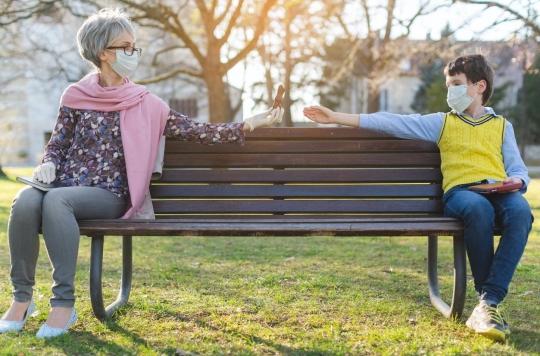Social distancing, in effect to combat the spread of the coronavirus, has put a stop to hugs and kisses between individuals. A loss of human warmth that can be compensated by other small attentions.

- Human contact reduces stress, improves sleep, is essential for infant development and for the elderly.
- We have to rethink our relationship with each other and compensate for the loss of human warmth with signs of affection such as better listening, a gift or the choice of words.
The coronavirus pandemic, and the resulting barrier measures, have changed our human relationships. Elbow checks, foot checks, military salutes, or nods have replaced handshakes, kisses or even more or less personalized hand checks. “Social contacts are very ritualized, almost automatic, and now we have to be careful”, contextualizes for Why Doctor Benjamin Lubszynski, psychotherapist in Paris. A model that needs to be reinvented so as not to lose the benefits of physical contact.
Human contact, essential for babies and the elderly
Physical signs of affection are essential and have medical power over our organism. They are even essential for newborn babies. A hug improves sleep and the immune system, but also reduces stress and depression. A study published in the journal Neuropsychopharmacology shows that male friendships and the manifestations of these (generosity, affection, etc.) make it possible to fight against stress by countering its physiological effects. In a study published in the journal Pediatricsresearchers have shown that premature infants who have benefited from “skin-to-skin” are twice as likely to reach their 20th birthday as those who received only standard care. “Humans have brain pathways specifically dedicated to detecting affectionate touchdescribed in New York Times Johannes Eichstaedt, a social scientist and computational psychologist at Stanford University. Our biological systems communicate our sense of security, the feeling that we are loved or that we are not alone through affectionate touch..”
For some people, this human contact can even play the role of therapy. This is particularly the case for seniors. “In the elderly, and a fortiori those who have degenerative problems, we know that contact conveys a series of sensations and information that remain with them and which allows them to be stimulated, comforted and provide them with security.confirms Benjamin Lubszynski. Physical contact is essential for these people, whether with relatives or with the nursing staff, the hairdresser or through pedicure or manicure treatments. This is very important in nursing homes.”
Giving freedom back to low-risk children
Touch defines the relationship we have with the other. It happens very quickly since it is one of our first actions when we meet someone. “Often we shake hands or kiss before we even speakcontinues Benjamin Lubszynski. There is something in touch which is direct and which conveys, a bit like smell, very strong sensory and emotional information. This is one of the first things that allows you to know someone: there is the physical and the clothes then comes the handshake or the kisses which give a lot of information on the social origin, the education, the politeness, the distance that the person maintains with you or on his ambition towards you, whether friendly or in love.”
In children, touch is essential for their constitution and development. In addition, several studies have shown that in the face of Covid-19, they are at little risk and are small contaminators. “The protocols put in place in schools do not take this reality into account.argues Jean-Paul Stahl, infectious disease specialist at the Grenoble University Hospital. The impact of masks in kindergarten or the disinfection of pens after each use is extreme. At the beginning of the epidemic we lacked information so the containment measures were appropriate. Now that we know more, and in particular that children are at little risk, we must give them freedom.”
A rebalancing, like a person who loses meaning
This unprecedented situation, induced by the health crisis, forces us to rethink our way of behaving with others. All over the world, new ways of greeting each other abound on the internet, as in China where the “Wuhan check”, in reference to the Chinese region from which the pandemic started, which consists of saying hello to each other with your feet. But these affective marks can also be replaced by other means. “We can compensate by caring for the otherproposes Benjamin Lubszynski. You can bring sweetness with your way of speaking. The warmth that we lose with contact can be found with words. We can also compensate with small attentions such as bringing a gift. It’s a rebalancing, like people who lose meaning and where others will increase tenfold.”
To circumvent social distancing rules while continuing to be careful not to transmit the virus, Linsey Marr, a researcher at Virginia Tech and one of the world’s leading experts on the transmission of airborne diseases, gives her advice to New Yorkers to cuddle while making sure not to transmit the virus. She describes at New York Times that you have to wear a mask, have your head on one side, hold your breath if possible and, for children, let them hug your knees. In the same line, the New York health authorities recommend wearing a mask… during the sexual act! “These measures are absurdreplies Jean-Paul Stahl. It’s unrealistic and it induces paranoia in everyday life. We must prevent common sense from continuing to evaporate. We know that the virus is transmitted by the respiratory route but we are not going to put each other in a spacesuit!”.
.















